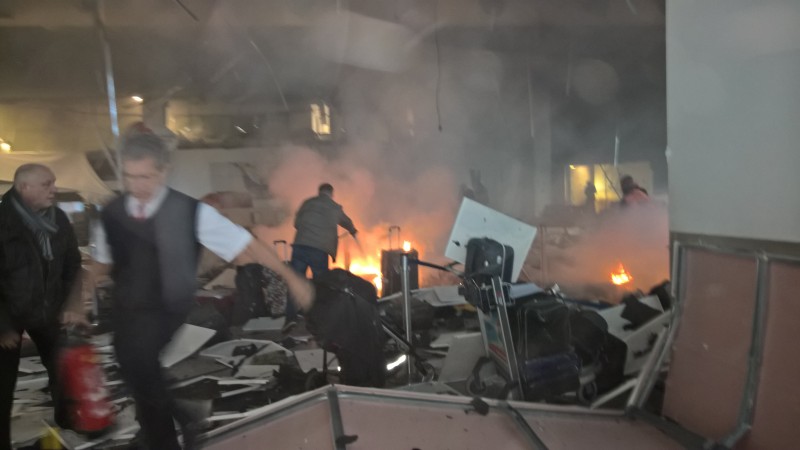Adelma Marina Tapia Ruiz was moments away from boarding a plane to New York, where she and her family were looking forward to reuniting for Easter.
Her husband and 3-year-old girls had just stepped away from the boarding area at Brussels’ international airport. That’s when an explosion ripped the family apart, Peruvian state media said.
Ruiz, a Peruvian national living in Brussels, was killed in the blast, the Andina news agency reported. Her husband and daughters escaped serious injury.
The 36-year-old mother was one of at least 30 people killed in attacks at the airport and at a Brussels metro station. Another 230 people are wounded.
“We were fearing terrorist attacks,” Belgian Prime Minister Charles Michel said. “And that has now happened.”
As authorities scramble to figure out who plotted the attacks — and how they eluded counterterrorism efforts — new details are emerging about the suspected suicide bombers at the airport.
Brothers identified
Police identified two brothers as the suspected suicide bombers who detonated explosives at the Brussels airport, a senior Belgian security source told CNN.
Khalid and Brahim El Bakraoui are suspected of having ties to the November terror attacks in Paris, according to the source.
The brothers were known to police for organized crime, but not for acts of terrorism, Belgian state broadcaster RTBF reported.
As officials try to learn more about the El Bakraoui brothers, investigators are scrambling to find a third suspect believed to be at large.
That man, shown in surveillance footage wearing a light-colored jacket and black hat, was seen pushing a luggage cart along with the other two suspects.
“The third man left a bomb in the airport, but it didn’t explode,” Belgian Interior Minister Jan Jambon said. “We are now looking for this guy.”
A day of horror
Jef Versele was in the airport’s departure hall when bombs exploded.
“You cannot believe it; you cannot believe it,” he said. “It was so insane. Not in my backyard.”
The second blast inside the airport blew out windows and caused parts of the ceiling to fall, he added.
“People were on the floor,” Versele said, estimating he saw 50 to 60 who were thrown to the ground and didn’t seem to be able to walk.
“It’s horrible; Belgium doesn’t deserve this,” said Alphonse Lyoura, a baggage handler at the airport.
About an hour later, another explosion took place at the subway station, killing at least 20 people.
The blasts paralyzed the city, shutting down transport and leaving residents terrified of more attacks.
Officials declared three days of national mourning beginning Wednesday.
ISIS claims responsibility
ISIS claimed responsibility for the carnage, but authorities said it’s too soon to say for sure whether the terror group was behind the coordinated attacks.
In its message claiming responsibility, ISIS noted that Belgium is one of the nations “participating in the international coalition against the Islamic State.”
The prime minister said Tuesday he had “no information” about who was responsible.
But Michael Weiss, co-author of “ISIS: Inside the Army of Terror,” said he wouldn’t be surprised if ISIS was indeed behind the bloodshed.
“I find it very hard to believe that it would be another group such as al Qaeda,” Weiss said. “Brussels, we have seen, is honeycombed with ISIS networks and sleeper agents.”
Two senior U.S. officials told CNN they believe the Belgium attack is tied to the same network as Salah Abdeslam — the Paris attacks suspect who was arrested in Belgium last Friday after four months on the run. ISIS also claimed responsibility for the November attacks in Paris, which killed 130 people across the city.
Spurred by Abdeslam’s arrest?
Weiss said Abdeslam’s arrest may have hastened an attack by ISIS.
Abdeslam was supposed to carry out a suicide bombing during the Paris attacks, Weiss said, but “by all accounts, he seems to have chickened out.”
After his arrest Friday, “it’s been reported that he is cooperating with Belgian authorities,” Weiss said.
“Now ISIS will have gotten wind of that fact, and if they fear that whatever human intelligence he has about the active networks in Europe will be given to European officials, they might have … accelerated any plans that they had for forthcoming terror attacks.”
‘A ticking time bomb’
Belgium has been a top concern for counterterrorism officials for years because of the large number of Belgian foreign fighters who traveled to join ISIS and other terror groups in Syria and Iraq. Many have been returning.
“The Belgians have been sitting on a ticking time bomb,” a U.S. counterterrorism official said.
And a Twitter post widely circulated by prominent ISIS backers Tuesday featured the words, “What will be coming is worse.”
But the interior minister said Belgians refuse to be defeated.
“Our police services and our investigation services are very professional people, but we are convinced that also the terrorists .. are professionals too,” Jambon said.
“They’re well trained and well formed. So it’s a difficult battle against them. But I’m convinced that we will win.”
